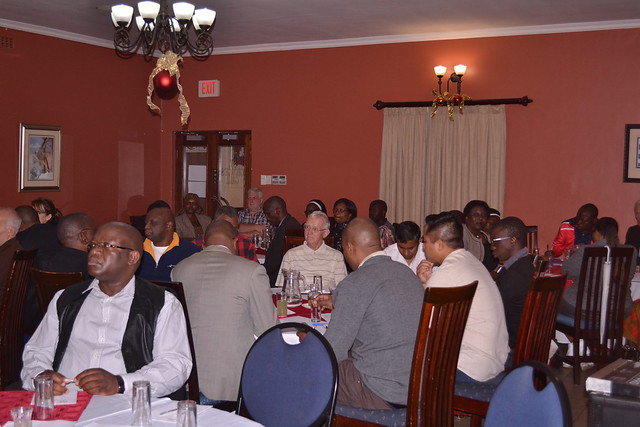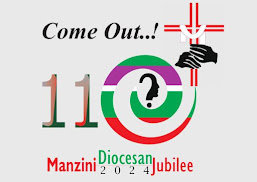“Round tables are designated to facilitate dialogue and participation in public life. They inform opinion, deepen knowledge and clarify concepts. 'Round tables' are a participatory process.” This was the introduction of the invitation letter to the first round table organised by the Catholic Church in the Kingdom of Swaziland.
In partnership with the “Dennis Hurley Peace Institute” (DHPI) and with the support of the “Catholic Parliamentary Liaison Office” (CPLO) on Thursday 23 November we were able to materialise an initiative we had been working on since the beginning of the year.
Though a small presence in the country, for decades the Catholic Church has been running many projects regarding health, education and poverty alleviation among others.
Through awareness gatherings in different parts of the country this year saw us more involved in issues of “Gender based violence” and “Human Trafficking”.
The initiative of having “round tables” looks at a new project: to create new spaces for dialogue and participation. Spaces where different voices can engage and be heard.
The first one, “Faith in the fight of Human Trafficking” brought together members of parliament, representatives of Christian churches, youth, priests, religious and other invited guests.
Danisa Khumalo (DHPI director) shared on Thursday that “this is not only the first in Swaziland by the Catholic Church but also the very first I attend where the tables are, in fact, round!”
Four speakers had been invited:
• Fr Peter John Pearson (CPLO director and member of the “Santa Marta Group”) put us into the global picture of human trafficking at the levels of the concept, numbers and profits!
A person has to be delivered, recruited, transported, transferred, harboured, sold, exchanged or leased within or across the borders of South Africa.
There has to be a threat or use of force, coercion, abduction, fraud, deception, abuse of power or vulnerability, or payments or benefits to a person in control of the victim.
The victim has to be trafficked for the purpose of exploitation, which includes sexual exploitation, servitude, forced labour, child labour or the removal of body parts.
He pointed out that the dehumanisation of people is the key starting point for our engagement against human trafficking. The dignity of the human person is the key on which we build all Christian ethics. Therefore the Church needs to stands up and say “no” to this unbelievable form of modern slavery and crime against humanity
He said: “Slavery, in fact, is not a footnote that happened hundred of years' ago. It is something that has continued unbroken and it is manifested today in the trafficking in persons.”
 |
| Some of the members of parliament who attended the round table with Fr PJ Pearson (CPLO) and Danisa Khumalo (DHPI) |
• Inspector Zwakhele Dlamini (police officer based in Manzini), brought us into the Swazi context. “When this issue came out we were in a state of denial. 'It cannot happen in Swaziland' we said. Then we realised the number of people reported missing in our communities”. He indicated unemployment, child abuse (a child finding no alternative but to run away from violence at home), domestic violence (running away from an abusive husband) as some of the elements that facilitate human trafficking.
He then added “let us not fool ourselves thinking it only happens between countries. Inside our country a girl is taken from Lavumisa area and brought to Manzini for domestic servitude. She never gets paid at the end of the month...”
• Head of Secretariat on Human Trafficking Mrs Nompumelelo Lukhele having explained the terminology, legal frame and Swazi framework, helped us identify the role of faith based organisations at the levels of:
◦ prevention: awareness raising programs where members of each faith may be sensitized on issues surrounding trafficking in people;
◦ protection: helping with victim identification, care and assistance. Being aware of what can be done, who to contact and for what. Provision of shelter, food, clothing, medical care and attention as well as psychosocial, spiritual and counselling support;
◦ prosecution: case identification, encouraging the reporting of cases
• Mrs Fikile Motsa, St Anne's president, shared her own experience raising awareness. Attending a workshop organised by the Catholic Church in Cameroon some years' ago, she opened her eyes to the reality of human trafficking in the world. Back in the country she made sure our diocese would start awareness programs and partner with government in the fight against it.
Few minutes were given between speakers for each “round table” to write down some questions and comments to be shared later:
• “indifference will not help anyone, all of us are needed to work together”
• “we need to be vigilant because it is among us, we might even be promoting it by doing nothing”
• “we need to understand it better and run awareness programs in our churches and institutions”
• “people are broken souls, our churches might be able to identify those affected and help them”
In my closing remarks I thanked the speakers and everyone who attended and understood the importance of these spaces of dialogue. Future round tables might be held on “refugees” and “gender based violence”.
I then asked everyone: “Count on us because, for us, this is a faith issue. As Mrs Lukhele said today 'we are our brother's and sister's keeper'”.
Click on the photo below
for photos of the event
(from Flickr)






